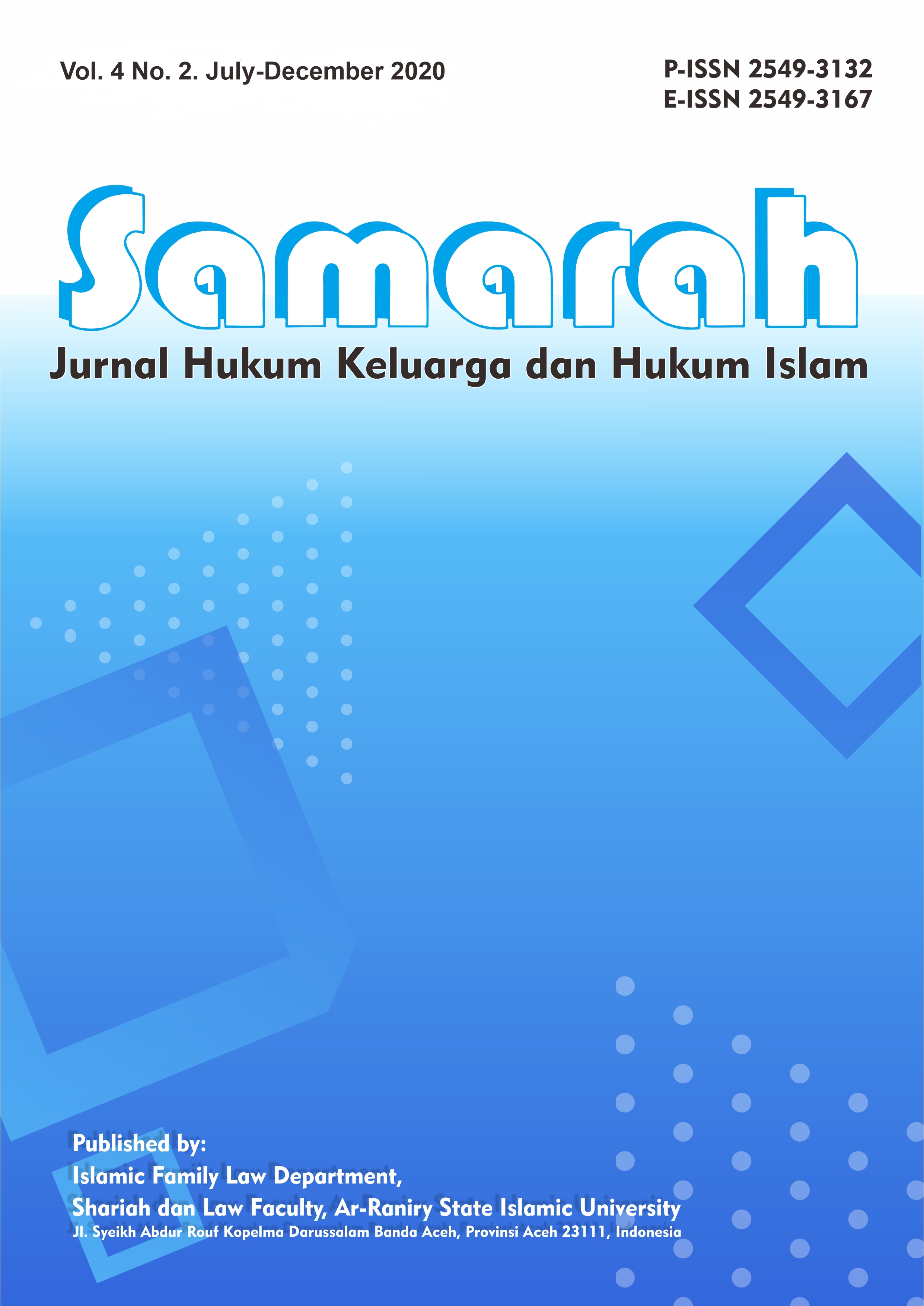Mainstreaming of Gender Equality in Islamic Family Law: Opportunities and Challenges
DOI:
https://doi.org/10.22373/sjhk.v4i2.8110Keywords:
Gender equality, Islamic family law, opportunities and challengesAbstract
This study discusses the mainstreaming of gender equality in Islamic family law. As it is known, gender equality and Islamic law have axiological links in realizing family household that practices the universal values such as justice, literature, peace, love, compassion, etc. This research is a qualitative study with a gender perspective linked to Islamic law. The discussion showed that a number of opportunities were found as normatively affirmed in the Qur'an which has the same spirit as the mainstreaming of gender equality in Islamic family law. Likewise, legal rules such as the Compilation of Islamic Law and the development of Islamic studies caused the normative theological understanding to support gender equality. However, it cannot be denied that the understanding of theological texts has begun to erode in the context of the implementation of Islamic family law. For the challenges, there were several aspects that hinder the mainstreaming of gender equality in Islamic family law, namely marginalization of women, community stereotypes against women, subordination of women, double burden on women, and violence against women.
References
Ali Asghar Engineer, Hak-Hak Perempuan dalam Islam, Yogyakarta: Lembaga Studi Pengembangan Perempuan dan Anak, 1994.
Amrullah Ahmad, Dimensi Hukum Islam dan Sistem Hukum Nasional: Mengenang 65 Tahun Prof. Dr. H. Bustanul Arifin, SH., Jakarta: Gema Insani Press, 1996.
Anthony Synnott, Tubuh Sosial, Simbolisme, Diri dan Masyarakat, Yogyakarta: Jalasutra, 2007.
Azni Zubair, Aktualisasi Hukum Kewarisan Islam (Studi tentang Kesadaran Hukum Masyarakat di Desa Wollangi Kecamatan Barebbo terhadap Hukum Kewarisan Islam), Al-Risalah: Jurnal Hukum Keluarga Islam, Volume 3 No. 2, 2017.
Bani Syarif Maula, Perlindungan Perempuan dalam Hukum Perkawinan di Indonesia: Wacana Pembaharuan Undang-Undang Perkawinan dalam Masalah Batas Usia Perkawinan, Yinyang: Jurnal Studi Islam, Gender dan Anak, Volume 14, No. 1 June 2019.
Eti Nurhayati, Psikologi Perempuan dalam Berbagai Perspektif, Yogyakarta: Pustaka Pelajar, 2012.
Instruksi Presiden No. 1 Tahun 1991 tentang Kompilasi Hukum Islam.
JM. Muslimin, Hukum Keluarga Islam dan Potret Interrelasi Sosial, Jurnal Ahkam, Volume XV, No. 1, 2015.
Kaslina dkk., Kesetaraan Gender Pegawai Dinas Pertanian, Jurnal Equilibrium, Vol. III No. 1, 2015.
Mardliyah, Isu Gender dalam Pendidikan Islam, Jurnal Pendidikan Ilmu Sosial, Volume 25, No. 2, 2015.
Moh. Kalam Daud dan Rahmatul Akbar, Harueta Peunulang: Protection of Women in Aceh According to Customary and Islamic Law, Samarah: Jurnal Hukum Keluarga dan Hukum Islam, Volume 4 No. 1 January-June 2020.
Muhammad Septiadi dan Winati Wigna, Pengaruh Ketimpangan Gender terhadap Strategi Bertahan Hidup Rumah Tangga Buruh Tani Miskin di Desa Cikarawang, Sodality: Jurnal Sosiologi Pedesaan, Volume I, No. 2, 2013.
Mursyid Djawas, Ijtihad Hakim dalam Penyelesaian Perkara harta Bersama di Mahkamah Syar’iyah Banda Aceh (Analisis dengan Pendekatan Ushul Fiqh, Ar-Raniry: International Journal of Islamic Studies, Vol. 1, No. 2, December 2014.
Murniati, A. Nunuk P., Getar Gender, Magelang: Indonesia Tera, 2004.
Ratih Probosiwi, Perempuan dan Perannya dalam Pembangunan Kesejahteraan Sosial, Natapraja: Jurnal Kajian Ilmu Adminsitrasi Negara, Volume 3, No. 1, 2015.
Silmi Novita Nurman, Kedudukan Perempuan Minangkabau dalam Perspektif Gender, Jurnal Al-Aqidah, Volume 11, No. 1 June 2019.
Sri Wahyuni, Pembaharuan Hukum Keluarga Islam di Negara-Negara Muslim, Jurnal al-Ahwal, Volume 6, No. 2, 2013.
Syahril Jamil, Konstruksi Hukum Keluarga Islam di Indonesia, Jurnal Usrah, Volume 3 No. 1, 2017.
Zaiyad Zubaidi, Problematika Pembagian Harta Bersama di Samalanga-Bireuen, Jurnal al-Ijtimaiyyah, Volume 5 No. 2 June 2019.

Downloads
Published
Issue
Section
License
Authors who publish in Samarah: Jurnal Hukum Keluarga dan Hukum Islam agree to the following terms:
- Authors retain copyright and grant the journal right of first publication with the work simultaneously licensed Attribution-ShareAlike 4.0 International (CC BY-SA 4.0) that allows others to share the work with an acknowledgment of the work's authorship and initial publication in this journal.
- Authors are able to enter into separate, additional contractual arrangements for the non-exclusive distribution of the journal's published version of the work (e.g., post it to an institutional repository or publish it in a book), with an acknowledgment of its initial publication in this journal.
- Authors are permitted and encouraged to post their work online (e.g., in institutional repositories or on their website) prior to and during the submission process, as it can lead to productive exchanges, as well as earlier and greater citation of published work. (See The Effect of Open Acces)









